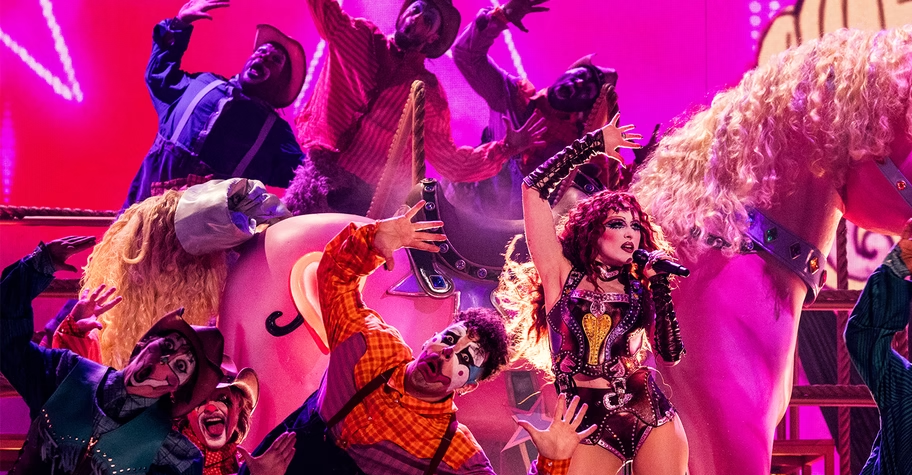This year’s Grammys ceremony celebrated a new class of willful, distinct talents.

John Shearer / Getty
February 3, 2025, 9:30 AM ET
Looking quite a bit like a wizard casting a curse, Chappell Roan accepted her first ever Grammy by criticizing the music industry. Upon being named Best New Artist at last night’s ceremony, the 26-year-old singer took to the stage in a pointy cap (which promptly fell to the floor) and a robe that was scrunched into pearlescent folds. Reading from a notebook, she recalled being dropped from her first record deal in 2020 and feeling “betrayed by the system.” She urged labels to stop exploiting artists, by paying a living wage and providing health care.
These were striking words to hear from someone who, by all appearances, is thriving in “the system.” A theatrical vocal talent whose songs are barbed with sass and spite, Roan is pop’s greatest success story of the past year. She received nominations in all of the Grammys’ “big four” categories, and she put on an opulent, eye-popping performance featuring a troupe of rodeo clowns. Critical though it was, her speech fit well with a ceremony that felt like a generational changing-of-the-guard, ushering in a new class of willful, distinct talents.
Grammys ceremonies tend to be quickly forgotten, but this one stands to be remembered for a few reasons. One is that Beyoncé won her first ever Album of the Year, for her country-inflected album Cowboy Carter. Another is that the Los Angeles fires reshaped the night: host Trevor Noah repeatedly urged viewers to donate to relief efforts, ad space was given to local businesses that had burned down, and a group of firefighters presented the evening’s final award. The politics of Donald Trump’s second term loomed large as well: Noah joked that his deportation might be imminent; Lady Gaga spoke up for transgender visibility; Alicia Keys said, “DEI is not a threat; it’s a gift.”
But the real shake-up of these Grammys was simply the fact that the telecast felt primarily like a showcase for new music—and not for the nostalgic reunions and tributes of past ceremonies. The tone was set early on when the 25-year-old Sabrina Carpenter put on a medley of her hits “Espresso” and “Please Please Please.” The performance played up Carpenter’s signature attribute, her humor, by having her feign mistakes and miscues and then regain her composure. In a pretaped segment, she cracked, “I’m just being myself—with maybe bigger hair.”
Read: The Grammys are built on a delusion
Carpenter, like Roan, was nominated for Best New Artist, and many of the category’s nominees provided instantly viral moments. Benson Boone, a 22-year-old glam rocker, got his tux torn off and then executed flips in a glistening bodysuit; Raye, a 27-year-old hip-hop–soul fusionist from the U.K., crooned and scatted with remarkable finesse in front of an old-timey bandstand. Most impressively, the 26-year-old rapper Doechii blazed through an eclectic array of vocal techniques and physical postures alongside a legion of dancers in matching suits. Her outré presentation recalled the pioneering rapper Missy Elliott, but she also smoldered with a rare, know-it-when-you-see it quality: potential.
This being the Grammys, music history was still a big part of the telecast—but even this year’s definition of “legacy” felt a bit updated. After so many years in which the great rockers of the 20th century seemed to run the show, it now appears that the Millennials are becoming eligible for luminary treatment. (The Rolling Stones and the Beatles, centerpieces of many prior Grammy ceremonies, won their awards off camera.) Lady Gaga and Bruno Mars, acting like respected statespeople, performed a haunting rendition of the Mamas & the Papas’s “California Dreamin’” in response to the fires. A well-conceived tribute to Quincy Jones spanned the age spectrum: Herbie Hancock and Stevie Wonder shared memories from behind the piano, but crucial contributions also came from Janelle Monae (doing a physical Michael Jackson impression) and Wicked star Cynthia Erivo (dreamily interpreting Frank Sinatra).
The final awards of the night also called to mind generational change. Kendrick Lamar’s “Not Like Us” was named Song of the Year and Record of the Year—which is only the second time a rap track has been honored in either of those categories. Those wins, along with Beyoncé’s, will be celebrated as deserved but overdue, given the much-publicized difficulty that Black artists have had in the Grammys’ major categories over the years. The Academy may well have made significant progress in reforming itself to be more inclusive; several presenters took care to note the 13,000 voting members who chose the winners (and The Weeknd broke his years-long boycott of the Grammys to perform this time). Another simple factor to keep in mind: Beyoncé, 43, and Lamar, 37, have built bodies of work whose significance gets, with each passing year, harder and harder to deny.
Beneath all of the evolution these Grammys represented was a technological and social one: streaming. In the past few years, established stars and savvy newcomers seem to have figured out that the key to success in an era of content overabundance isn’t to try to be as broadly appealing as possible—it’s to play up one’s own personality, ambition, and even weirdness. Cowboy Carter, a genre-blending opus that caused consternation in the country-music world, is one example of that approach. Dressing like Merlin and demanding more of the industry that’s celebrating you is, quite delightfully, another.
